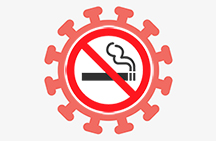NCD Watch
Smoking, NCDs and COVID-19
26 Aug 2020 (Wed)
 All forms of tobacco use, including cigarettes, water-pipes, cigars, e-cigarettes, heated tobacco products, are harmful. Cigarette smoke contains a lethal mixture of more than 7 000 chemicals, including at least 69 known carcinogens that damage nearly every organ in the body. Smoking causes a wide spectrum of NCDs, such as chronic obstructive pulmonary disease, cancers, heart diseases, stroke and diabetes mellitus. Cigarette smoking also increases risk of systemic infections, particularly respiratory infections.
All forms of tobacco use, including cigarettes, water-pipes, cigars, e-cigarettes, heated tobacco products, are harmful. Cigarette smoke contains a lethal mixture of more than 7 000 chemicals, including at least 69 known carcinogens that damage nearly every organ in the body. Smoking causes a wide spectrum of NCDs, such as chronic obstructive pulmonary disease, cancers, heart diseases, stroke and diabetes mellitus. Cigarette smoking also increases risk of systemic infections, particularly respiratory infections.
The coronavirus disease 2019 (COVID-19) is an infectious disease that primarily attacks the lungs. Emerging data from around the world suggests that smokers, compared to non-smokers, who have contracted COVID-19 are more likely to develop severe complications and die. For example, a meta-analysis published in May 2020, consisting of 19 independent studies with 11 590 COVID-19 patients in China, Korea, and the United States, found that smoking can double the risk of severe COVID-19 progression.
In addition to the risk of smoking tobacco, evidence has also shown that waterpipe smoking may increase the risk of transmission of infectious diseases in social gatherings, including COVID-19. The World Health Organization (WHO) points out that the design of the waterpipe apparatus and the manner of use promote the growth and transmission of microorganisms. Waterpipes are commonly shared between smokers, and the parts of the apparatus are difficult to be completely disinfected after each smoking session.
The dual epidemics of NCDs and COVID-19 accentuate the importance of quitting smoking. Quitting smoking yields significant and immediate health benefits:-
- In 20 minutes, blood pressure and heart rate drop to normal levels.
- In 12 hours, carbon monoxide level in blood drops to normal.
- In 2 to 12 weeks, lung function and circulation improves.
- In 1 to 9 months, coughing and shortness of breath decrease.
- In 1 year, risk of coronary heart disease is halved compared to a smoker.
- In 5 to 15 years, risk of stroke is reduced to that of a non-smoker.
- In 10 years, risk of lung cancer is halved; risk of cancers of the mouth, throat, oesopha-gus, bladder, cervix, and pancreas decreases.
- In 15 years, risk of coronary heart disease is that of a non-smoker.
For smokers, quitting smoking is the single best thing they can do for themselves and everyone around them. It is never too late to stop smoking. Smokers can visit www.livetobaccofree.hk This link will open in a new window or call the Quitline 1833 183 for more information on quitting and for free quit support and services.






































